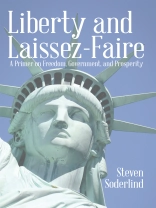With the election of Donald Trump as president of the United States of America, the relationship between laissez-faire and liberty is drawing renewed attention.
Steven Soderlind, an economist and professor emeritus at St. Olaf College in Northfield, Minnesota, delves into how the two are connected, emphasizing the critical role that economics and politics play in determining our liberty in this extended essay.
His goal is to encourage thoughtful reflection on government at a time when many associate liberty with minimal intervention. Find out what the past tells us about preserving and promoting liberty as well as the thoughts of venerable economists, philosophers, and critics such as Adam Smith, Thomas Robert Malthus, David Ricardo, Karl Marx, John Stuart Mill, August Friedrich von Hayek, Joseph Alois Schumpeter, Gunnar Myrdal, and Milton Friedman.
Throughout his analysis, Soderlind seeks to answer a key question: Is laissez-faire or government action the preferred route to liberty?
Join the author as he considers the advantages and disadvantages that laissez-faire brings to the quest for liberty and our continuing mission to form a more perfect Union.
عن المؤلف
Steven Soderlind is professor emeritus at St. Olaf College, Northfield, Minnesota. During forty-some years of teaching, he specialized in urban and regional economics, the history of economic thought, and social choice. He also led international travel studies and taught across the curriculum in statistics, great works, and the history of science. He earned a bachelor of arts degree in mathematics and economics from the University of Minnesota and a Ph.D. in economics from the University of Massachusetts at Amherst.












